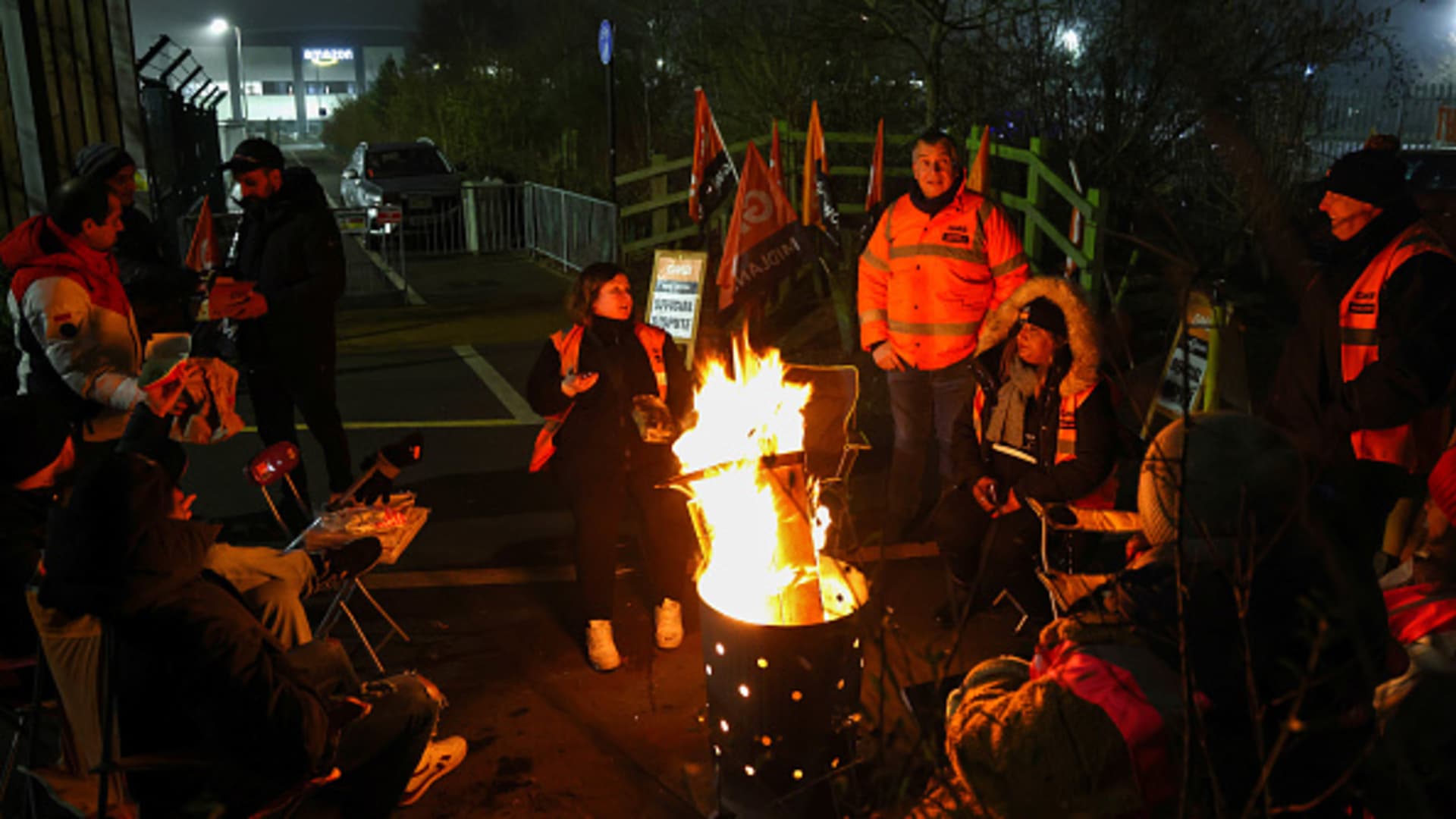‘Robots are treated better’: Amazon warehouse workers stage first-ever strike in the UK

Amazon packages move on a conveyer belt at a fulfillment center in England.
Nathan Stirk | Getty Images
Amazon workers are going on strike in Britain, in a move that marks the first formal industrial action in the country for the U.S. tech giant.
The 24-hour strike action began Wednesday a minute after midnight. Strikers are expected to picket outside the company’s site in Coventry in central England throughout the day. The GMB Union, which represents the workers involved, said it expects 300 employees out of a total 1,000 at the plant to turn up to the walkout.
Staff are unhappy with a pay increase of 50 pence (56 U.S. cents) per hour, equivalent to 5% and well below inflation. Amazon introduced the pay hike last summer. But warehouse workers say it fails to match the rising cost of living. They want the company to pay a minimum £15 an hour.
They also want better working conditions. Amazon workers have raised concerns about long working hours, high injury rates, and the unrelenting pace of work, as well as aggressive, tech-enhanced monitoring of employees.
A spokesperson for the tech giant told CNBC in a statement that the staff involved represent “only a fraction of 1% of our UK employees.” The spokesperson said that pay for Amazon’s U.K. warehouse workers has increased 29% since 2018, and pointed to a £500 one-time payment made out to staff to help with the cost-of-living crisis.
Striking workers gather around a fire pit on a picket line at the Amazon.com Inc. fulfilment centre in Coventry, UK, on Wednesday, Jan. 25, 2023.
Bloomberg | Bloomberg | Getty Images
Wednesday’s action against the frim is the first legally mandated strike to take place in the U.K. Amazon’s U.K. staff previously stopped working spontaneously in August and on Black Friday in November.
‘Historic’
Darren Westwood, one of Amazon’s warehouse workers taking part in the strikes, said it “has been a long road” to the day itself, which he described as “historic.”
“We all saw the profits they’re making during the pandemic — that’s what angered people more,” Westwood told CNBC via phone call. “We were expecting a better increase than what they were imposing.”
Someone the other day said we’re treated like robots — no, robots are treated better.
Darren Westwood
Amazon warehouse worker
Inflation has soared due to increased energy costs and supply chain disruptions stemming from the war in Ukraine. Consumer prices rose 10.5% year-over-year in December; in response, the Bank of England has hiked interest rates to tame rising costs.
Westwood said that he and his partner are in a reasonable financial position for now. But he worries for other employees, one of whom he said was working 60 hours a week to meet mortgage payments.
“Someone the other day said we’re treated like robots — no, robots are treated better,” Westwood told CNBC.
Wednesday’s action in the U.K. comes as Amazon is laying off thousands worldwide. The company began laying off 18,000 workers last week in an attempt to dial back some of the expansion it undertook during the Covid-19 period and brace for a possible recession in 2023.
Earlier this month, Amazon launched a consultation to close down three of its U.K. sites, where it employs a combined 1,200 people. The move is not part of Amazon’s 18,000 job cuts, according to the firm.
Amazon has long been criticized for labor shortcomings, with the company often accused of poor working conditions in its warehouses and delivery operations and squashing attempts from employees to unionize. In April, staff at the company’s Staten Island warehouse in New York became the first group in the U.S. to vote in favor of joining a union.
“We stand in solidarity with the Amazon workers of Coventry fighting for higher pay and benefits,” Chris Smalls of Amazon Labor Union, which established the union, told CNBC. “It’s time Amazon who claims to be Earth’s best company come to the table and bargain in good faith with its unions.”
Amazon has previously said its employees have the right to join or not join a union, but that it doesn’t believe unions are the best choice for its workers.









